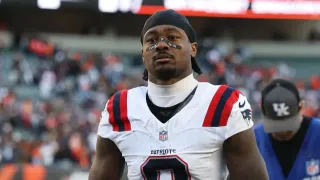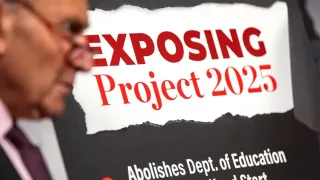April 3, 2023
Jodie Comer, Paul Mescal Take Acting Gold at Olivier Awards
Jill Lawless READ TIME: 2 MIN.
Screen stars Paul Mescal and Jodie Comer scored prizes at London's Olivier Awards on Sunday for their first-ever West End stage roles, while a stage adaptation of Japanese animated classic "My Neighbor Totoro" won six trophies.
Irish actor Mescal – an Academy Award acting nominee this year for "Aftersun" – was named best actor in a play for his turn as the brutish Stanley Kowalski in "A Streetcar Named Desire" at the Almeida Theatre. Anjana Vasan won the best supporting actress award for playing Stella in Tennessee Williams' scorching drama, which was named best revival.
Mescal, 27, said his rapid success "doesn't feel real."
"But it's kind of happening at such a rate that there is no time to stop and think, 'This is a phenomenal feeling,'" he said.
Liverpool-born Comer, 30, won the best actress in a play award for the one-person show "Prima Facie," which she is taking to Broadway later this month. Suzie Miller's drama about a lawyer dealing with the aftermath of a sexual assault was also named best new play.
Comer, who shot to fame as star of TV spy series "Killing Eve," gave a shoutout "to any kids who haven't been to drama school, who can't afford to go to drama school, who has been rejected from drama school -- don't let anyone tell you that it isn't possible."
"My Neighbor Totoro" was named best entertainment or comedy play at the Oliviers, the U.K. equivalent of Broadway's Tony Awards. Phelim McDermott won best-director trophy for the Royal Shakespeare Company's adaptation of Studio Ghibli's magical coming-of-age film. It also took prizes for sound, lighting, costumes and sets.
"Standing at the Sky's Edge," an urban elegy set to the music of singer-songwriter Richard Hawley, was named best new musical, while an edgy, pared-down take on Rodgers and Hammerstein's corn-fed classic "Oklahoma!" won the prize for best musical revival.
Arthur Darvill won the best-actor in a musical prize for playing Curly in "Oklahoma!" Katie Brayben was named best actress in a musical for playing televangelist Tammy Faye Bakker in the Almeida Theatre's "Tammy Faye."
Musical Supporting performance trophies went to Beverley Knight for hiphop suffragette story "Sylvia" and Zubin Varla for "Tammy Faye." Will Keen was named best actor in a play for playing Vladimir Putin in "Patriots," a play about the Russian leader's relationship with oligarch Boris Berezovsky.
Keen called his character a "living, breathing, internationally recognized villain."
Veteran actor Derek Jacobi received a lifetime achievement award to celebrate his six-decade career.
Hannah Waddingham – a West End musical star before she found TV fame as the owner of a struggling soccer team on "Ted Lasso" -- hosted the ceremony at London's Royal Albert Hall, which included performances from musical nominees including "The Band's Visit," "Sylvia," "Tammy Faye," "Oklahoma!" and "Sister Act."
The prizes were founded in 1976 and named for the late actor-director Laurence Olivier. Winners are chosen by voting groups of stage professionals and theatergoers.






